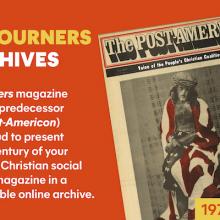Consumerism
“Lord, to those who hunger, give bread. And to those who have bread, give the hunger for justice.”
—Latin American prayer
I love grocery shopping. The tidy rows of boxes and cans, the perfect mounds of fruit, the wheeling of carts, the checking of lists, the whoosh of the automatic mister that leaves the leafy greens sparkling. I even like the Muzak.
So last summer, to celebrate the grand opening of a Super Giant grocery store in Washington, D.C.’s Columbia Heights neighborhood, I walked five blocks to buy flour for my fiancé’s birthday cake. Behind the renovated Tivoli Square complex, which now houses the Sojourners office, I found a gala underway: red, white, and blue bunting, a live salsa band, and shoppers scrambling for the opening-day sales.
I was impressed by the row of gleaming registers (no more long lines at the dingy Safeway on Columbia Road), the piles of fresh produce (no more wilted lettuce from the tiny SuperSave on Mount Pleasant Street, though it did have homemade tamales and a cashier who knew my name), and an entire aisle of organic options (no more car trips to Glut food co-op in Mount Rainier, Maryland). Also, I’d heard talk in the neighborhood about all the new jobs, and sure enough, there was an army of green-aproned cashiers and stockers.
In his landmark book Fast Food Nation, Eric Schlosser reported that, in a global marketing survey, McDonald’s Golden Arches proved to be a more widely recognized symbol than the Christian cross. The arches are second worldwide, after the Olympic rings. The cross comes in third.
Of all the changes that struck American culture in the last quarter of the 20th century, the explosive growth of the fast-food industry would have to count as one of the most destructive. That’s a big claim. We’re talking about a period of history that saw the advent of music videos, infomercials, and call-waiting. But I’ll stand by it.
Foodways are among the most essential defining elements of any culture; in the past few decades, ours have changed almost beyond recognition. Twenty-first century America has, in large part, left behind regionally grown, home-prepared food for globalized, pre-packaged, sweetened, and fatty convenience stuff. Just as we’ve surrendered control of our free time, and even our inner consciousness, to the TV and advertising industry, we’ve turned over responsibility for much of our daily sustenance to a few transnational marketing corporations.
We are what they sell us. And, in exchange, the lords of the fast-food empire have promised to free us from cooking, dishwashing, and (at least briefly) from complaining children. The consequences of this bargain are written across our strip-malled landscape, our low-wage economy, and our increasingly bloated bodies.
A few years ago, the “postmodern memoir” or “autobiographic novel” was all the rage among critics anxious to define new literary genres.
I was disturbed by the article “Taking Back Our Kids.” The authors seem to think the best way to combat the consumer culture in which we live, and the problems it causes our children, is for one parent to stay at home. I disagree.
They assume that parents work only to keep up with the mounting bills created by a capitalist society. They neglect to acknowledge that many people, especially women, work for self-fulfillment. This is not being selfish. This is being healthy.
Having witnessed the devastating effects of Hurricane Katrina, it may be hard to imagine anything comforting about a whirlwind. They remind us that we are small and fragile.
Why God's abundant life won't fit in a shopping cart, and other mysteries of consumerism.
A call from the Taize community: make the church a parable of sharing and it will play its part in healing the wounds of the human family.

